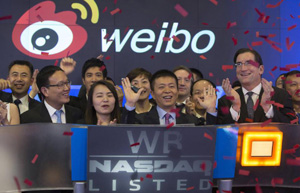The rally in Chinese IPOs in January and February is almost double the 26 percent advance for companies that listed globally outside of China, according to data compiled by Bloomberg. All 48 Chinese offerings rose on their first day, and all but two are still sitting on gains.
"IPO markets historically have been a great market to get in," Fraser Howie, a director at Newedge Singapore and co-author of Red Capitalism: The Fragile Financial Foundation of China's Extraordinary Rise, said by phone on June 10. "You have the government controlling prices."
Chinese IPOs have burned some investors who bought the shares after their first day of trading. Shaanxi Coal Industry Co, which jumped 14 percent in its Shanghai debut in January, has since lost 11 percent through last week as the company reported a 53 percent drop in first-quarter net income. Guirenniao Co, a maker of sports shoes, has tumbled 18 percent since its first day of trading on Jan 24 after full-year profit slid 20 percent.
"IPOs are always good for a punt," Andy Xie, the former World Bank economist who's one of the 50 most influential people in global finance according to last year's ranking by Bloomberg Markets magazine, said in a phone interview on June 12. "But very few go up on their own merits."
The CSRC is trying to curb speculation in new share offerings. The regulator halted IPO sales for at least a year through November to strengthen the quality of listed businesses and prevent investors from colluding to manipulate prices.
Chinese exchanges will suspend trading in IPO shares for 30 minutes on their debut if moves exceed 10 percent from opening prices, and will cap gains or losses at 20 percent.
Speculators have flocked to IPOs since the birth of the nation's exchanges in Shenzhen and Shanghai in the early 1990s.
Shenzhen's sale of lottery tickets offering a chance to buy shares in August 1992 drew hundreds of thousands of investors to the southern city and sparked days of violence after application forms ran out.
At the height of China's stock market bubble in 2007, PetroChina Co surged 163 percent in its trading debut, briefly making it the world's first $1 trillion company. The stock has since dropped 83 percent through last week.
For Liu Xi, a 36-year-old hotel sales manager in Shanghai, the potential for big returns on IPOs and a lack of profitable alternatives make them worth the risks. Liu plans to invest 100,000 yuan in new share offerings, switching from wealth management products.
Wealth management products and trusts, which typically offer a fixed return by pooling investor funds to make loans, have lost some of their appeal as slowing economic growth raises default risks and authorities seek to restrain a surge in credit that began with a government stimulus package during the global financial crisis in 2008.
While the central bank cut reserve ratio requirements for some lenders this month, President Xi Jinping said in May the nation needs to adapt to a "new normal" slower pace of expansion. The International Monetary Fund called on China this month to refrain from implementing more stimulus.
Chen, the accountant who works for a State-owned property and logistics company, said he expects at least 10 percent returns from his IPO investments. And he shows no signs of worrying about the kind of losses he suffered in gold.
"Such a return is pretty secure," Chen said. It's "virtually riskless".
|
 |
 |
| Top 10 Chinese Internet firms eyeing IPOs in US | IPOs launched by Chinese companies in US this year |
